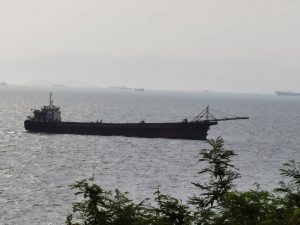Amid public concern in Taiwan over thousands of illegal Chinese sand dredging ships in the Taiwan Strait, particularly those that swarm alarmingly close to Taiwan’s offshore islands, the Taiwanese government is considering new regulations that would facilitate sinking Chinese dredgers seized by Taiwan’s coast guard, including for use as artificial reefs or as target ships in military exercises. However, Taiwan is not in this alone, as the vast scale and scope of Chinese illegal dredging has made it a multinational issue.
Sinking the seized illegal dredgers would signal a marked change from Taiwan’s past practices of auctioning impounded ships, which critics say have been insufficient in deterring illegal activities. This is seen as an attempt by the Taiwanese government to contain the harm caused by illegal dredging, which touches upon a multitude of issues ranging from maritime resources, marine ecology, and even the maintenance of infrastructure such as underwater cables.
On a clear day, up to hundreds of Chinese dredging ships illegally mining for sand can be spotted from the Matsu Islands. The islands, administered as Lienchiang County by Taipei, are located 200 kilometers from the main island of Taiwan, but only 20 kilometers off the coast of China’s Fujian province. Once on the frontlines of the Cold War between the Communists and the Taiwan-based Nationalists, the islands currently face a different type of threat. People in Matsu are concerned about the increasing numbers of illegal dredgers pumping tons of sand from the seabed, often invading waters within 6,000 meters of the islands, which are considered restricted waters by Taiwan’s coast guard.
Illegal Chinese vessels have not been limited to waters near Matsu. Earlier this year, environmental groups decried illegal Chinese sand mining in the Formosa Banks, an ocean shoal area situated in the southern portion of the Taiwan Strait. Environmentalists have called on Taiwanese authorities to clamp down on the dredgers, which reportedly draw up to 100,000 tons of sand daily, endangering maritime resources and causing catastrophic consequences to marine ecology. Other offshore island counties such as Kinmen and Penghu have also witnessed a large increase in Chinese dredgers throughout neighboring waters.
Dredging activities, which pump up large amounts of both sand and water to the ships, can cause a vast impact to the maritime environment. As dredging lifts material from the seabed, benthic organisms – marine life that live on or near the seabed – get suctioned in as well, littering the mined sand with broken shells and carcasses. In addition to negatively affecting the marine food chain, seabed habitats are largely destroyed in the process.
Here in Matsu, locals are also concerned that large amounts of sand lost to mining could lead to coastal retreat – the absence of sand in certain parts of the seabed could trigger a chain effect and accelerate shoreline erosion. Moreover, public outcry against dredging moves beyond environmental concerns, as the dredgers cause large amounts of noise pollution when they operate during the night. Others cite dredging as a possible factor in damaging underwater cables between the islands – including internet and phone cables – leading to concerns over the security of communications.
On a regional level, ultimately, the international community needs to demand China to take more responsibility in containing environmentally harmful activities. Dredging in the South China Sea has sparked more international discussion, particularly for its role in constructing artificial islands for military use. The Philippines is wary of illegal Chinese dredgers involved in “black sand mining” on its northern coast, as well as possible land reclamation plans for Scarborough Shoal; meanwhile, the United States has also hinted at sanctions on Chinese companies involved in land reclamation and dredging in the South China Sea. Along with military-related projects, Chinese dredging involves actors from many sectors, ranging from state-owned companies involved in government infrastructure projects to private development. As with many issues related to China, the line between public and private can often be hard to draw and additional information is needed to present a more comprehensive picture on the massive dredging industry.
Taiwan’s government is currently mulling more assertive measures to deter Chinese dredging, as the issue has elicited strong concern from Taiwan’s cabinet, the Executive Yuan. In a recent meeting in Matsu, Legislator Hung Sun-han emphasized the need to reexamine current regulations in order to deter illegal dredging. While current regulations prioritize auctioning the seized Chinese ships, it has been reported that the Chinese dredging companies easily repurchase captured vessels through Taiwanese intermediates. In contrast, sinking the impounded ships would send a stronger message, which would highlight the administration’s resolve to protect maritime resources in the region.
Wen Lii is director of the Democratic Progressive Party’s newly-launched Lienchiang County Chapter, located on the Matsu Islands, 20 kilometers off the coast of China’s Fujian Province. He is an analyst on foreign policy and regional security issues.

































